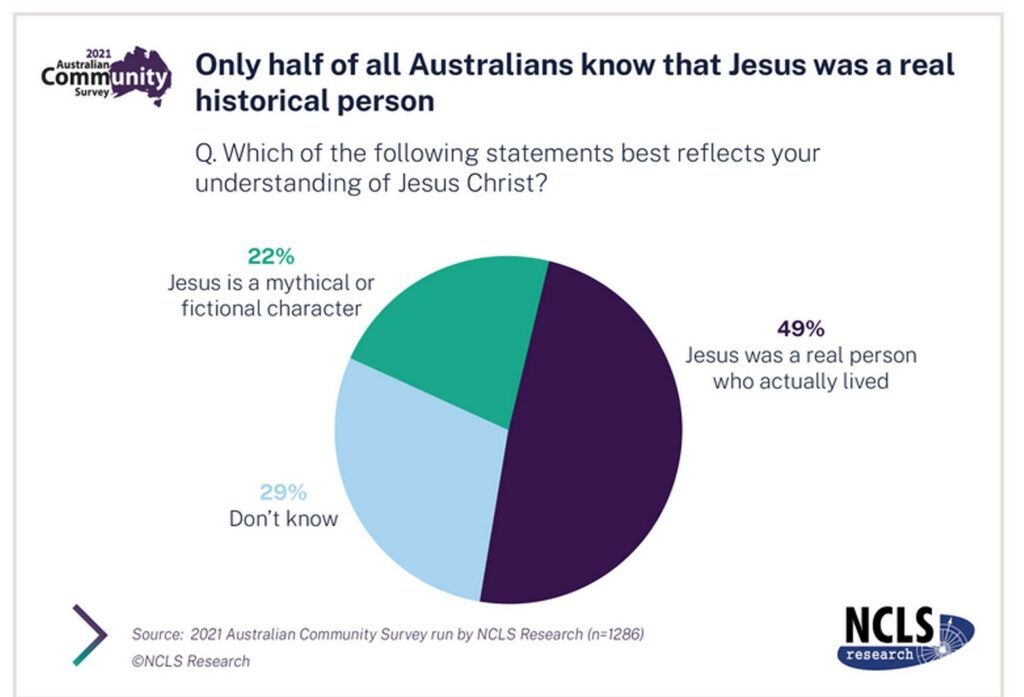As noted in a recent post, John Dickson [JD] wrote a lament over a significant number of Australians doubting the historicity of Jesus. Such a state of affairs was “bad news for historical literacy” in this country, he said. The thrust of his article suggested that more Australians should be mindful of what is found in certain major texts and fall into line if they wanted to be “historically literate” — as if historical literacy is about believing “authorities” without question. I pointed out that the sources JD referred to are not as assuring as he suggests and that they actually invite questioning. And a questioning engagement with teachers is how I would define genuine “historical literacy”.
In a follow-up post I noted that Miles Pattenden [MP] quite rightly responded to JD by noting that most classicists and ancient historians have had little (or no) reason, professionally, to take up serious research into the question of Jesus’s existence:
[T]he existence of a critical mass of scholars who do believe in Jesus’s historicity will almost certainly have shaped the way that all other scholars write about the subject. Unless they are strongly motivated to argue that Jesus was not real, they will not arbitrarily provoke colleagues who do believe in his historicity by denying it casually. After all, as academics, we ought to want to advance arguments that persuade our colleagues — and getting them offside by needlessly challenging a point not directly in contention will not help with that.
Today JD has responded to MP. In his rejoinder he plays a game with the above quote by throwing a double-edged ad hominem: he suggests that MP was claiming that ancient historians are sloppy and don’t do their homework if they refer to Jesus in the manner explained above. Nonsense. If the historicity of Jesus was the question other historians were addressing JD would have a point. But a historian of ancient Rome does not discuss the historical Jesus when he or she explores the rise of Christianity throughout the empire. Indeed, the historicity of Jesus is of little relevance to the larger questions historians of the ancient Roman era pursue, even “how to explain the rise of Christianity”, and in such a context there is nothing wrong with mentioning the traditional account of Jesus in passing.
JD is somewhat disingenuous when he writes (with my bolded highlighting)…
[MP] notes that the fact that secular specialists, by an overwhelming majority, accept the historical existence of Jesus does not amount to actual evidence of Jesus’s existence. That is true. Happily, I did not make such a claim. The thrust of my piece was merely to note the striking mismatch between public opinion and scholarly opinion on the matter of the historical existence of Jesus. I noted a recent survey which found only a minority of Australians believed Jesus was a real historical figure, and I thought it was worth pointing out that the vast majority of ancient historians (I said 99 per cent) reckon Jesus was a historical figure.
No statement is made “merely” to note a neutral fact. The clear point of JD’s article was to fault the view of too many Australians according to the National Church Life Survey. He twists the knife by comparing doubters of Jesus’ historicity to climate change deniers. Again, this is insulting since it presumes that people questioned in the survey are incapable of forming rational opinions on the basis of what they might thoughtfully read and listen to. Indeed, there are scholars, including historians, who have expressed the desirability that scholarship becomes more open to the question of the historicity of Jesus. Such academics have expressed some bemusement when theologians are so quick to ridicule and insult those raising the questions. A survey among academics comparable to the NCLS one of the general public might, I suspect, lower the rate of believers in academia at least a little lower than JD’s estimated 99%. Let a serious and open discussion — an essential element of “historical literacy” — begin.
JD then falls back on the supposedly reassuring evidence for Jesus. He refers to hypothetical sources “behind” the gospels such as Q. He points to the passages in Josephus and Tacitus as if those authors necessarily had first-hand knowledge of the facts and not have relied upon Christian stories extant in their own day. He even infers that ancient historians might not begin to write useful history about a figure until as much as 80 years after his death. That’s a somewhat mischievous statement given that he knows full well that such historians had a wealth of known written sources — not hypothetical sources — from the deceased’s own day to refer to.
The fact remains that ancient historians do have ways of determining who and what happened: they have primary sources (inscriptions, coins, archaeological remains) and written materials whose sources can be traced back to the times in question. For Jesus, however, historical Jesus scholars speak of hypothetical sources and the assumption of oral tradition “behind” the gospels. Classicists and ancient historians would be horrified if that’s all they had to work with and some of them have indeed expressed serious misgivings about the methods of their Bible-studying peers.


